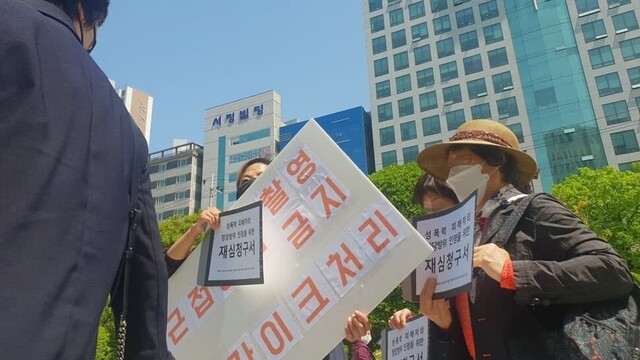Appeal to dismissal of request for retrial
“I want to recover my human rights trampled by the state”

Choi Malja, 75, is entering the Busan District Court (Geoje-dong, Yeonje-gu) building to file a request for retrial for recognition of self-defense on the afternoon of May 6 last year. By Oh Yeon-seo, staff reporter
“The world has improved so much, but why is the judiciary the same then and now?” Choi Malja (75) repeated the words “I can’t understand” in a telephone interview with the last 8 days. In 1964, when he was 18, he was convicted of biting the tongue of a man trying to rape him. In May of last year, Choi requested a retrial requesting recognition of self-defense, but the court dismissed it last month and did not respond to’Me Too in 56 Years’. This was the reason that the evidence presented by Mr. Choi could not be regarded as new clear evidence for acknowledging innocence, and that it was difficult to admit offenses on duty, such as judges, given the times when gender discrimination was prevalent. Upon hearing the news of the dismissal, Mr. Choi said, “My heart was awful.” “I couldn’t sleep because I remembered what I heard 56 years ago. I couldn’t stand still, so I climbed the mountain for 4 to 5 hours every day.” After the sexual assault, the male prosecutor Roh came to the house and threatened with a cleaver, the prosecutor who slammed the desk saying, “I cried the man because he was not good enough,” a judge and a lawyer who asked, “Can we marry Mr. At the time, Mr. Choi, who bit the tongue of Mr. Roh, was sentenced to 10 months probation for’severe injury’ and two years probation for 10 months, and Noh was sentenced to six months in prison for invasion of special housing and special threats and two years probation. The prosecution did not prosecute Mr. Roh’s alleged sexual violence. Choi immediately appealed to the court’s decision to dismiss it. “(The prosecution in 1964) subtracting the attempted rape from the attempted rape case is a problem in itself, and both past and present judgments do not fit into common sense. I will fight until I get acquitted in self-defense. I want to recover my human rights that have been trampled by the state.” As Choi learned about patriarchy, gender discrimination, and women’s rights, he finally learned why the things he had suffered were unreasonable. I locked my door and tried to starve, but my father didn’t send it to middle school because he was a girl. When I was 63, I attended a two-year middle and high school, and later graduated from the Department of Culture and Liberal Arts at Korea National Open University. While taking the’sex, love, and society’ course in college, I came up with a clear language to explain the vague’regrets’ who were victims of sexual violence and became perpetrators. The name’Malza’, hoping for a son, stole his father’s money to become a taxi driver, but couldn’t find a job, or dreamed of a community where single women lived, but it wasn’t all’natural’ that they had an unwanted marriage. I realized it. It was’solidarity’ that gave Choi the most strength. “Sister, let’s get rid of this resentment,” he said, “I got the courage to say something I couldn’t say for 56 years through the college classmates who helped, Choi visited Korean women’s calls, and’Me Too’ throughout our society. “I also made many attempts to give up life. But my destiny is mine, and I have the right to live happily. I think that only when this wrong judgment is eliminated, we can live happily without being ashamed of our descendants. When I came out of the world and asked for help, I got a lot of help beyond my imagination. I want to tell those who have experienced the same as me, let’s live to the end and fight and ask for help.” By Kim Yoon-joo, staff reporter
